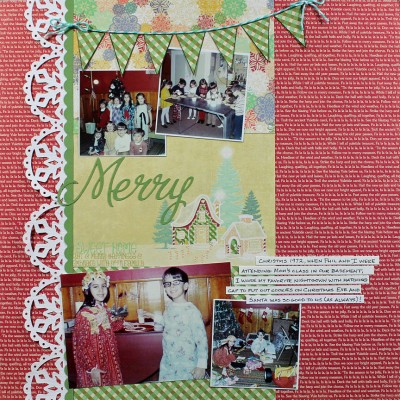Have you ever wondered why we say “Merry Christmas” to each other but don’t use the word “merry” in any other salutation throughout the year? You hear nary a “Merry birthday” or “Merry Valentine’s Day,” right? Well, I did a little online search for the history behind the popular Christmas greeting and found varying stories about when it all began. I’m sorry I can’t vouch for the correctness of its story either, but I’ve decided to share with you the description from Wikipedia:
“Merry,” derived from the Old English myrige, originally meant merely “pleasant and agreeable” rather than joyous or jolly.
Though Christmas has been observed since the 4th century AD, the first known usage of any Christmastime greeting dates back to 1565, when it appeared in The Hereford Municipal Manuscript: “And thus I comytt you to God, who send you a mery Christmas.” “Merry Christmas and a Happy New Year” (thus incorporating two greetings) was in an informal letter written by an English admiral in 1699. The same phrase is contained in the sixteenth century secular English carol “We Wish You a Merry Christmas” as well as the first commercial Christmas card, produced in England in 1843.
Charles Dickens’ “A Christmas Carol” was also published in 1843, during the mid Victorian revival of the holiday. The word merry was then beginning to take on its current meaning of “jovial, cheerful, jolly and outgoing.” Merry Christmas in this new context figured prominently in “A Christmas Carol.” The cynical Ebenezer Scrooge rudely deflects the friendly greeting: “If I could work my will…every idiot who goes about with ‘Merry Christmas’ on his lips should be boiled with his own pudding.” After the visit from the Ghosts of Christmas affects his transformation Scrooge exclaims, “I am as merry as a school-boy. A merry Christmas to everybody!” and heartily exchanges the wish to all he meets. Because of the instant popularity of “A Christmas Carol,” the Victorian era Christmas traditions it typifies and the term’s new meaning appearing in the book, Dickens’ tale popularized the phrase “Merry Christmas.”
I think it’s so cool that our saying “Merry Christmas” is bound up with Dickens’ famous story (which I’ve always loved)! Now that you know from whence it came, perhaps you will enjoy a little more heartily exchanging this greeting with all you meet during the season. 🙂
Here is a layout I created with photos from Christmas 1972. It’s based on a sketch from the Sketch Support site and uses patterned papers from Webster’s Pages and Jillibean Soup.



Leave a Reply